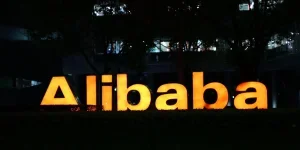Alibaba Group was established in 1999 by 18 people led by Jack Ma, a former English teacher from Hangzhou, China. From the outset, the company’s founders shared a belief that the Internet would level the playing field by enabling small enterprises to leverage innovation and technology to grow and compete more effectively in the domestic and global economies.
Alibaba has transformed the way people shop online and has become a household name in the e-commerce space. This means that, these days, whether someone is a seasoned entrepreneur or a curious consumer, understanding Alibaba’s role in the global marketplace has become essential.
So read on for an overview of Alibaba, including how to get started on Alibaba.com as both a seller and a buyer, and a glossary of key Alibaba terms and companies under Alibaba Group.
Table of Contents
An overview of Alibaba
Get started on Alibaba.com
Alibaba Group Holding Limited overview
An overview of Alibaba
This table presents an overview of the most searched questions about Alibaba.
| Question | Answer |
| What is Alibaba Group? | Alibaba Group is the parent company of Alibaba.com. Alibaba is a holding company of six major business groups: Taobao and Tmall Group, Alibaba International Digital Commerce Group, Cloud Intelligence Group, Local Services Group, Cainiao Smart Logistics Network Limited, and Digital Media and Entertainment Group, along with various other businesses. |
| What is Alibaba’s mission? | To make it easy to do business anywhere. |
| What is Alibaba.com? | Alibaba.com is a global wholesale marketplace where businesses can buy products in bulk from manufacturers and suppliers. |
| Does Alibaba.com manufacture products? | No, Alibaba.com does not manufacture products. It operates as an online marketplace connecting buyers with sellers, manufacturers, and suppliers. |
Get started on Alibaba.com
Alibaba.com, commonly known as Alibaba, is a global B2B marketplace operated by Alibaba Group. As the primary company of the Alibaba Group, it is important to understand how it works.
Getting started as a seller
To get started as a seller on Alibaba.com, follow these steps:
1. Create an account
Visit Alibaba.com and sign up for a seller account. Direct manufacturers or factories, wholesalers, or middlemen set up seller accounts.
Provide the required information, including
- Business details
- Contact information
- Verification documents
2. Choose a membership level
Sellers should decide on the membership level that best suits their business needs. Alibaba.com offers different membership tiers with varying benefits and features.
3. Complete verification
Alibaba.com’s verification services confirm that sellers are legally registered companies.
Complete the business verification process to build trust with potential buyers.
Undergo verification checks:
- A&V check: Provide documentation to verify your business license, contact information, business type, and company location.
- Onsite check: Allow Alibaba.com personnel and a third-party verification company to inspect the physical premises, production facilities, and operations.
- Assessed supplier (optional): Undergo an independent third-party verification process, such as by Bureau Veritas or TÜV Rheinland, to have the claims and capabilities verified.
4. Obtain verified supplier status
Once sellers have completed the required verification checks, they will be eligible to become a verified supplier on Alibaba.com.
This status is indicated by the verified supplier badge, which helps build trust and credibility with potential buyers.
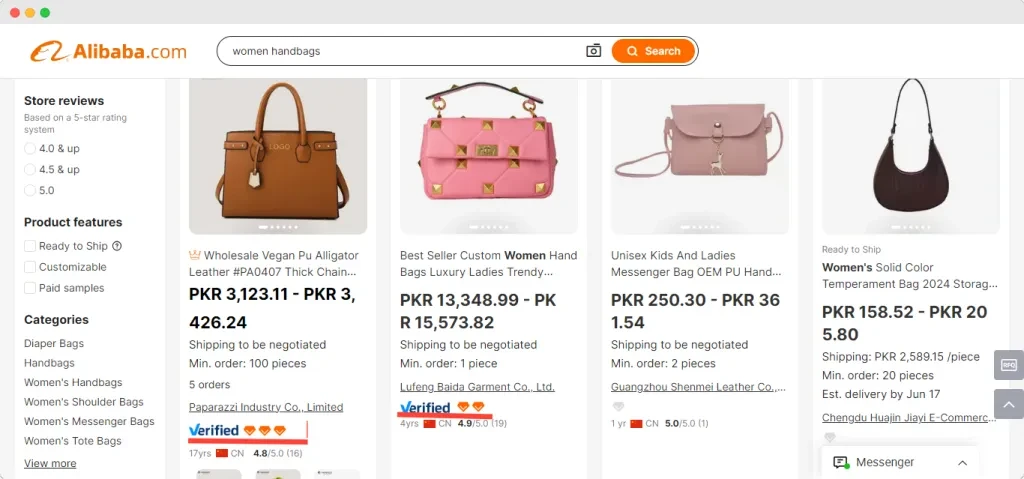
5. Set up your store
Once verified, set up the online store on Alibaba.com. Alibaba provides sellers with a multi-page store totally dedicated to businesses to display products. There is no need for coding and web development skills to create a store.
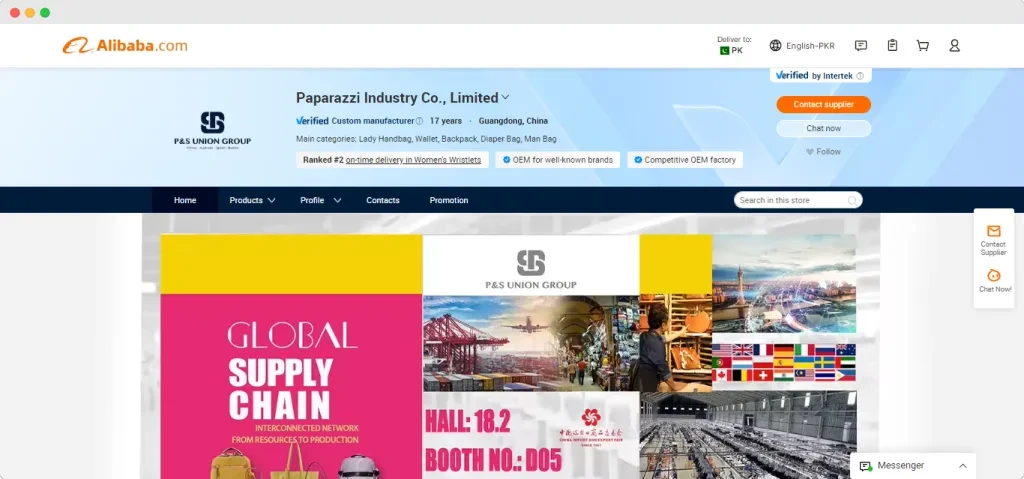
Globally, customers can find that store and autotranslate stores in 18 different languages.
Customize the store profile, upload product listings, and provide detailed descriptions, images, and pricing for each product.
Use Alibaba’s built-in AI tools for uploading products and writing listings.
Gold users can use the product showcase tool to boost the ranking of their listings.
6. Enable Trade Assurance if it’s available
Trade Assurance is an Alibaba payment service that protects buyers’ payments in case any issues arise during shipping or with product quality.
Sellers who activate trade assurance show up higher in search results and have the chance to be featured in sales, promotions, and product showcases.
Buyers automatically purchase from sellers that have enabled trade assurance because their payment is secure now.
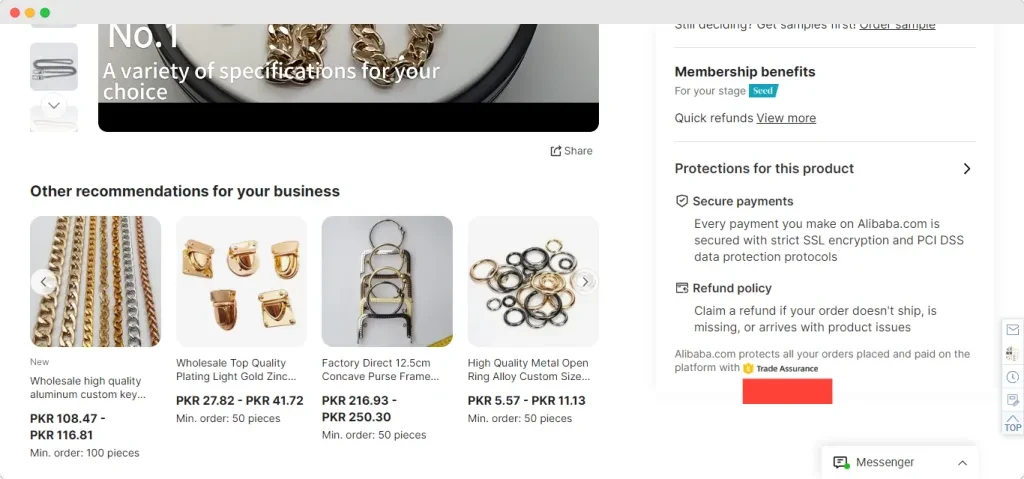
7. Reply to inquiries
After listing products, sellers will start receiving inquiries from buyers.
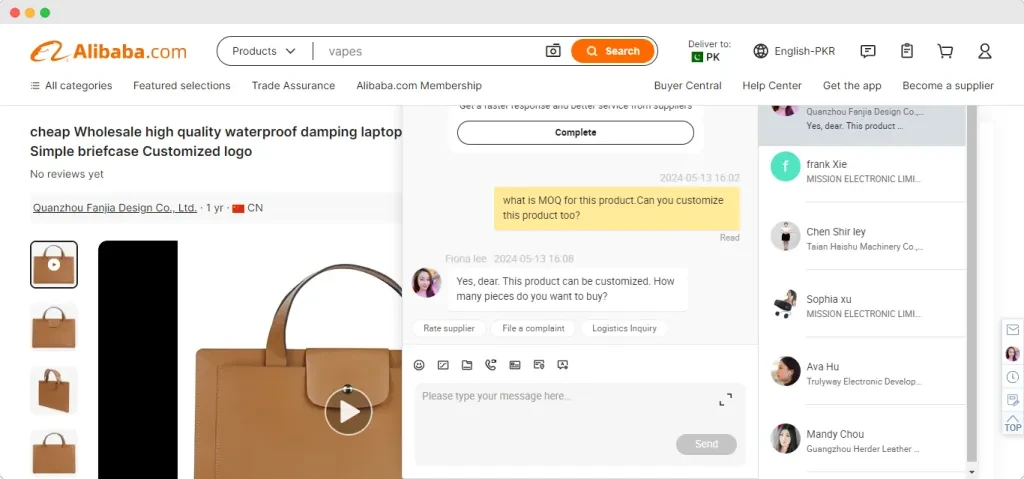
Alibaba.com daily receives over 500K inquiries.
According to Alibaba, inquiries that are replied to within four hours have 30% more follow-up responses from customers.
Sellers can use these Alibaba apps to get notified when inquired:
8. Promote your store
Sellers need to promote stores and products to reach a wider audience.
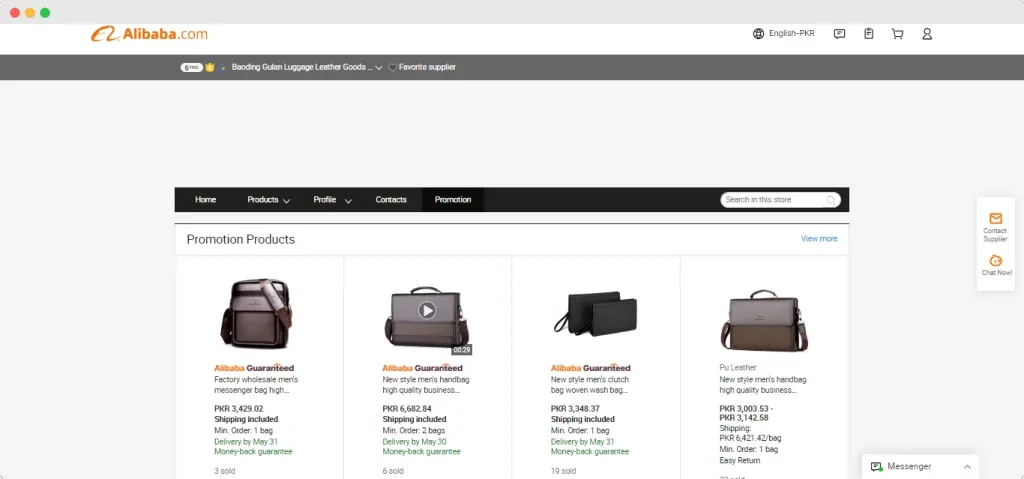
Alibabab offers the following tools for marketing the store:
With these few simple steps, sellers can set up their businesses on Alibaba.com.
Getting started as a buyer
1. Registering as a buyer on Alibaba.com
Login to the Alibaba website and register as a buyer.
Explore account features and settings.
This is Alibaba’s buyer dashboard.
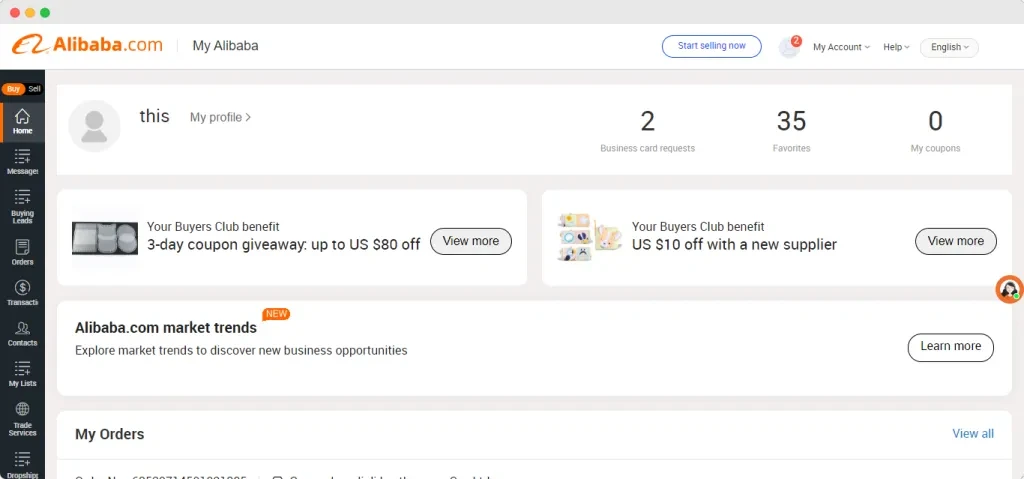
2. Search for products
Navigate Alibaba.com’s platform to find products of interest.
There are many ways to find products on Alibaba.com
Here are the best ways to search for products.
Use the search bar
Simply write keywords on the search bar at the top of Alibaba’s homepage. For example,”women’s handbags.”
Alibaba will show you products according to input keywords.
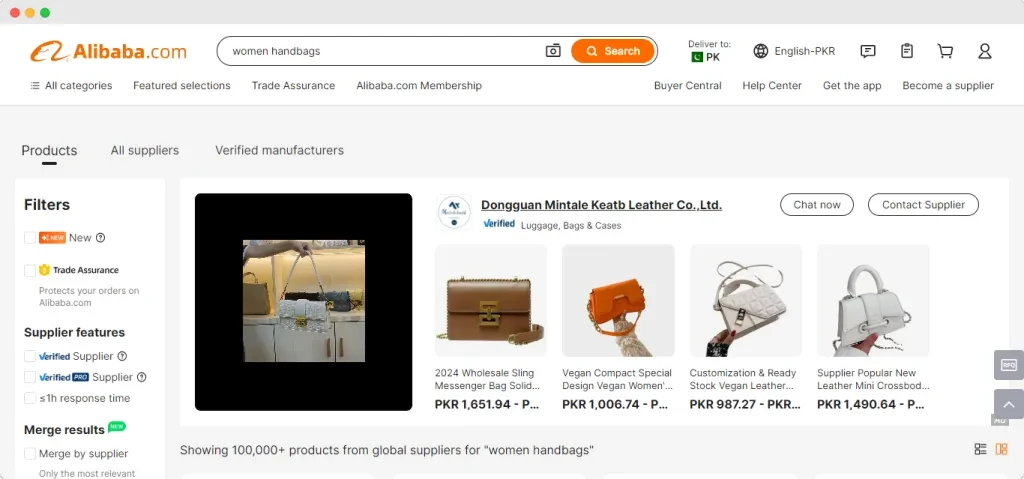
Use image search
Click on the image icon on the left side of the bar.
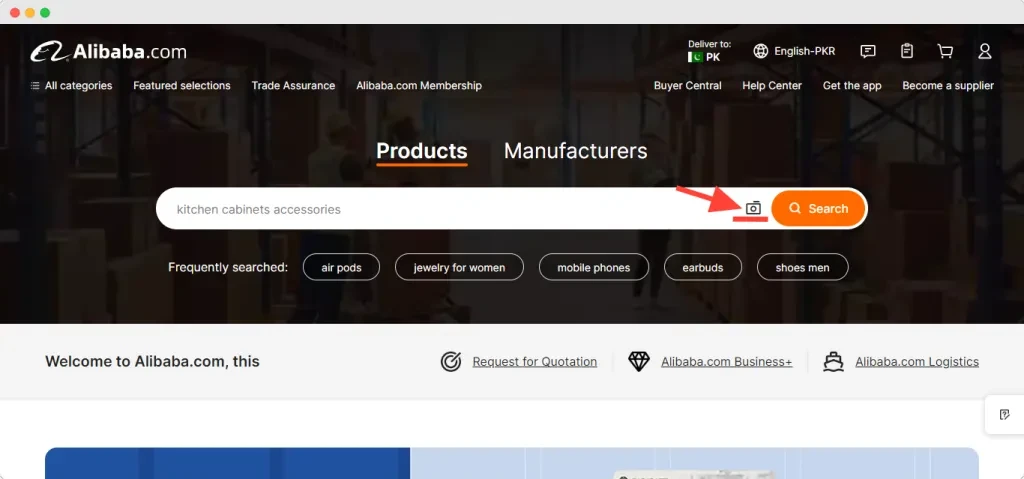
Select the required photo from the gallery and upload it.
Upon uploading, buyers will see products relevant to their uploaded photo.
Use filters
Use a filter to refine the search further.
Filters are on the left side of the website.
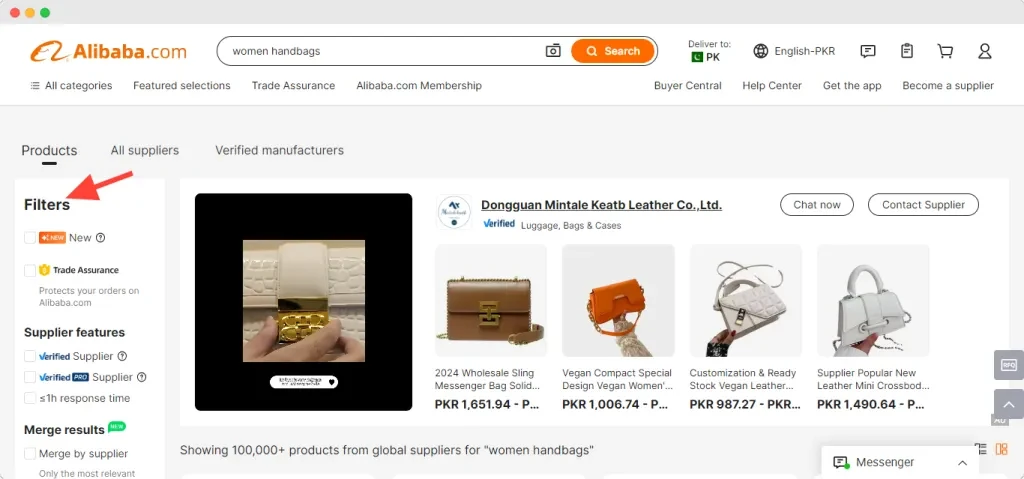
For example, a buyer is searching for a women’s handbag.
On top, there are options for suppliers, price, and MOQ.
At the bottom other filters depend upon the type of product like material, color, material, season, etc.
Use Alibaba’s RFQ feature
If someone doesn’t like to explore the above methods, they can use Alibaba’s RFQ (request for quotation) feature.
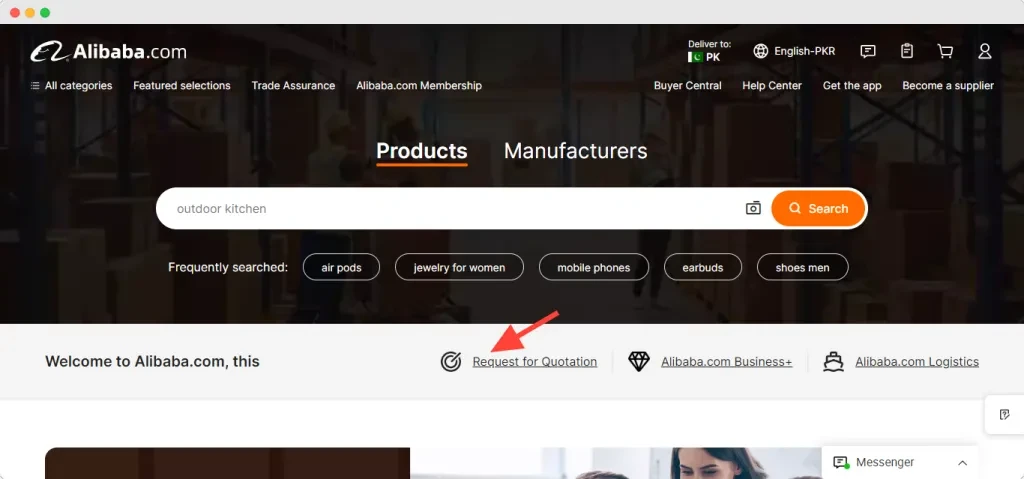
This feature makes product search a breeze. Buyers can access it at the top of the homepage of Alibaba.
A Request for Quotation (also referred to as an RFQ) is a sourcing request feature where a buyer submits details of the product they need to the Alibaba.com platform instead of an individual seller.
This is how it works:
Buyer submits RFQ ►Alibaba.com reviews RFQ ►Suppliers submit quotations ► Alibaba.com screens quotations ► Buyer receives quotations ►Trade begins
This feature is suitable for buyers who need customized products.
3. Evaluating sellers
There are many suppliers for products on Alibaba.com. So, it may be a challenge for buyers to select the best one.
Here are some proven tips to find the right seller.
Find the right supplier category
Alibaba has categorized its suppliers into the following categories:
- Trade Assurance: Alibaba acts as a mediator, protecting all orders made under this program.
- Verified Suppliers: Alibaba verifies the company details and manufacturing capabilities of suppliers through third-party companies like SGS and SUV.
- Verified Pro Suppliers: These are Alibaba’s Verified Suppliers with a proven track record of successful transactions.
- Gold Suppliers: These suppliers hold a paid membership on Alibaba to enhance their selling capabilities. Identified by a “Gold” icon, they are both “Verified” and may offer “Trade Assurance” services.
All buyers must know about supplier categories to make informed decisions.
New buyers should generally opt for trade assurance suppliers.
Check suppliers overview
There is a supplier overview under product pictures. This overview includes suppliers’ business history and performance on Alibaba.com.
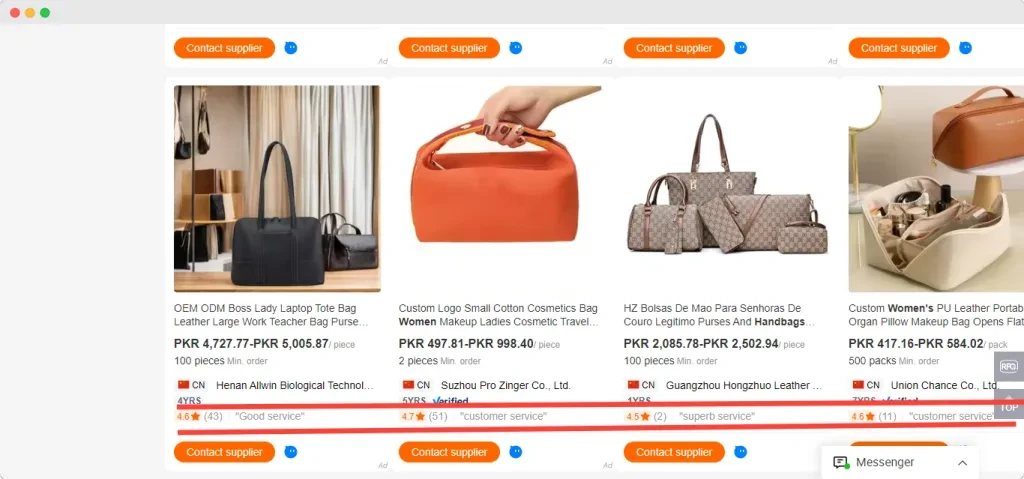
Additionally, also look at the information in their profile.
Don’t forget to check suppliers’ information in their profile history and reliability.
Read customer reviews and ratings of the suppliers.
Use supplier filter
A supplier filter is an excellent feature for shortlisting required suppliers.
Click on all suppliers at the top of the homepage. Then, supplier filters will pop up on the left side of the page.
Compare multiple suppliers
After shortlisting sellers, customers can compare offers of these shortlisted suppliers with the “compare feature.
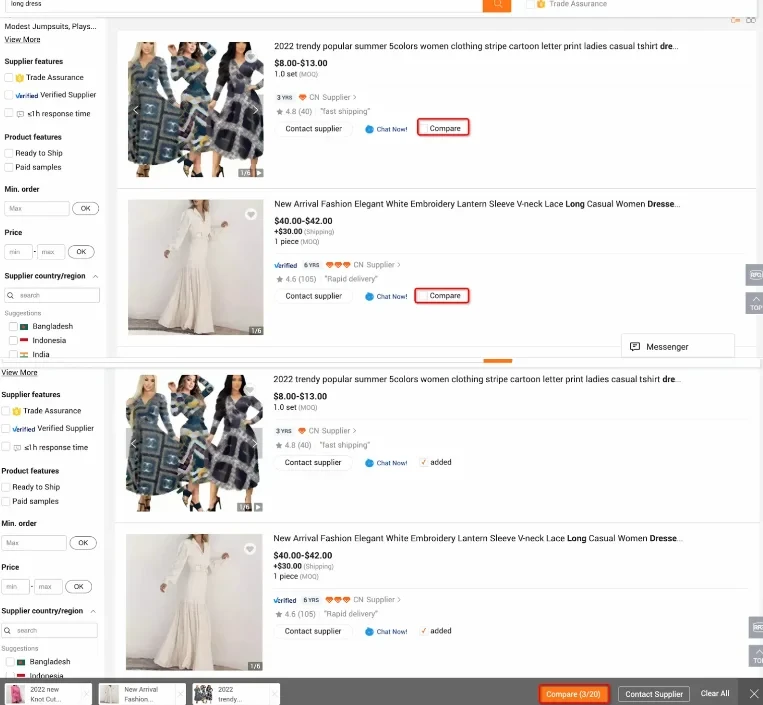
Click on the Compare button.
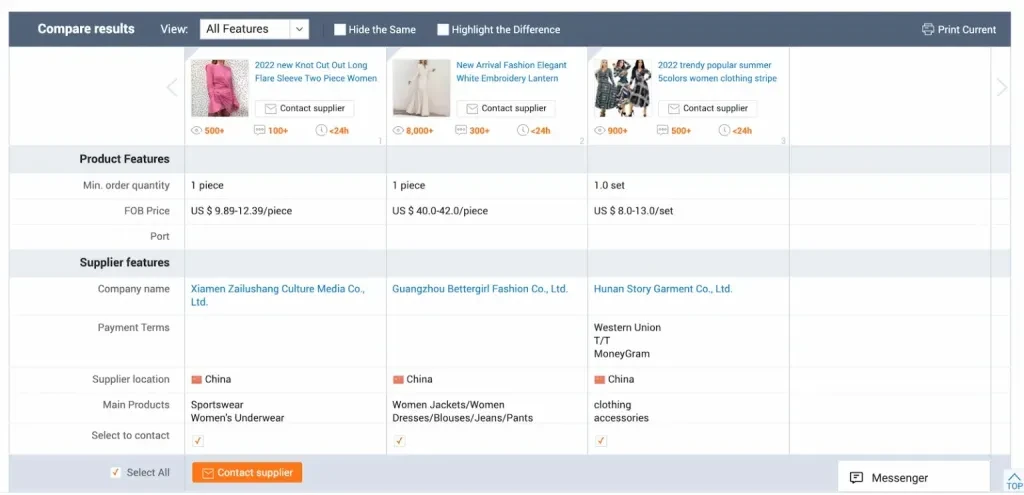
Choose different products to compare product features, supplier features, online performance, and trade capability.
Contact sellers
After shortlisting sellers, contact sellers to inquire about your queries.
At Alibaba, buyers directly speak to sellers.
Click on the “Contact Seller” or “Chat Now” icon on the product detail page to initiate communication.
1. Sellers can use the Inquiry form by clicking on the contact supplier icon. The inquiry form has all the basic details for asking sellers about their products and shipping times.
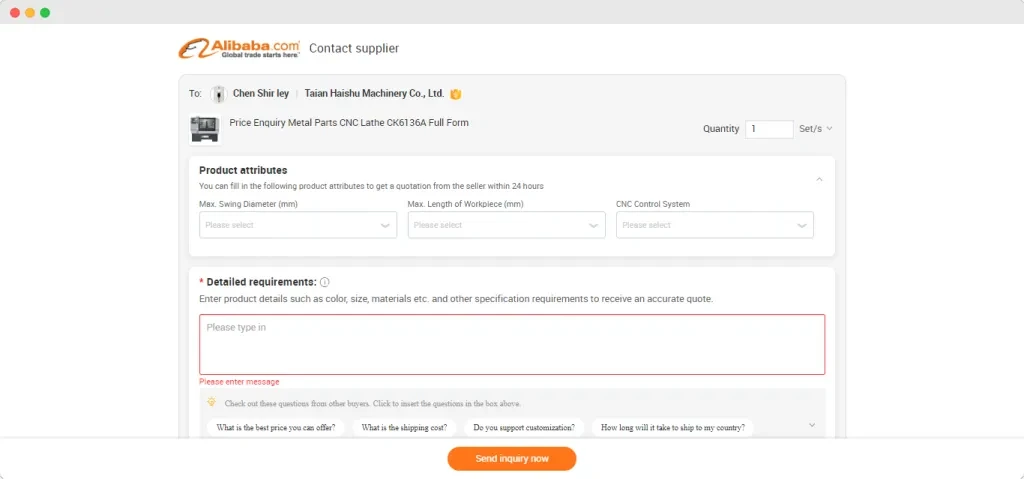
2. Chat Now is a simple chat room where anyone can chat like they would on any instant messaging platform.
Buyers can track records of all messages within “My Alibaba” in the message center.
They can also use the Alibaba.com mobile app for fast communication.
In this step negotiate all details about the product with sellers like MOQ, shipping, price, and customization.
4. Know payment terms
At this step, buyers have decided on the seller to work with.
Now, buyers should be aware of Alibaba’s payment terms as Alibaba supports many payment options.
Buyers’ private information is safe on Alibaba. All payments on Alibab.com are protected by strict SSL encryption and PCI DSS privacy protocols.
Alibaba advises buyers to never pay outside the platform.
Alibaba supports over 27 currencies, so buyers save on conversion fees.
Alibaba accepts the following payment methods:
- Credit/Debit cards
- PayPal
- Apple Pay
- Google Pay
- Afterpay/Clearpay
- Popular local options through the online checkout
Alternatively, buyers can choose to make bank-to-bank wire transfers with escrow protection using official bank information provided by Alibaba.com.
Here are details about payment.
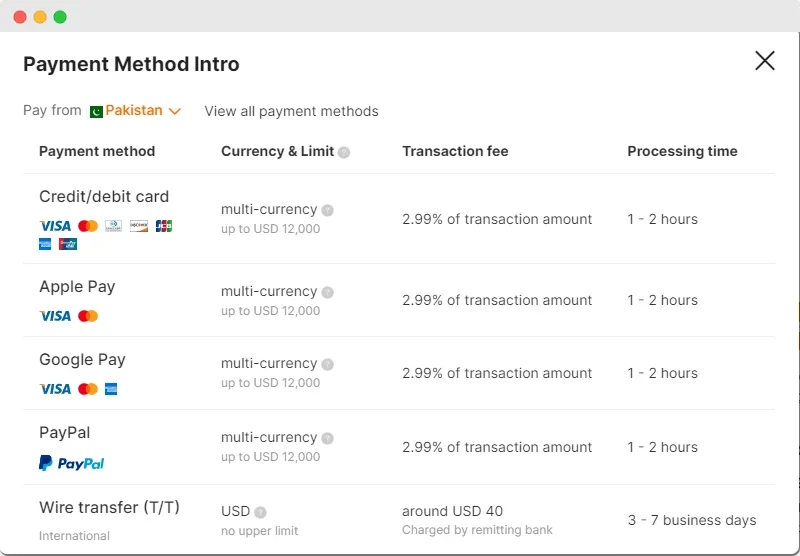
5. Ship the products
After sending payments, buyers look for shipping arrangements.
Alibaba offers a variety of shipping options for buyers to choose from when placing orders with suppliers:
Shipping options on Alibaba
1. Freight forwarder: Buyers can arrange for a freight forwarder to handle the international shipping of their goods. This allows for more control over the shipping process and potentially lower costs.
2. Supplier shipping: Many Alibaba suppliers offer their shipping services, which can be a convenient option. Buyers should carefully review the supplier’s shipping terms and costs.
3. Alibaba logistics: Alibaba has its own logistics services, including Cainiao Network, which provides shipping and fulfillment solutions for buyers.
4. Express delivery: For faster delivery, buyers can choose express shipping options like DHL, FedEx, or UPS, which are available through Alibaba’s platform.
By following these steps, buyers can effectively navigate Alibaba to run their businesses successfully.
Understanding Alibaba vocabulary
Like every platform, Alibaba has a vocabulary, and buyers must understand it to use Alibaba effectively.
Alibaba Vocabulary:
MOQ: MOQ means Minimum Order Quantity. This is the least quantity of specific products that sellers sell.
OEM: OEM stands for Original Equipment Manufacturing. Buyers can come up with their specifications, requirements, and detailed visions of their product and hand them off to an OEM factory. The OEM will start making customer products from scratch. It’s ideal for customers that need customized products.
QC: QC stands for Quality Control. Alibaba has multiple terms for the quality control process. Following are QC process terms.
IQC: IQC stands for Incoming Quality Control. It means controlling the quality of raw materials or anything that enters the factory for manufacturing products.
OQC: OQC stands for Outgoing Quality Control for finished products
IPQC: In-Process Quality Control (IPQC) involves monitoring and assessing product quality at every stage of the manufacturing process.
FOB: Free on Board (FOB) means that the seller is responsible for delivering the goods to the nearest port. However, the buyer assumes responsibility for shipping from that point onward, including any associated fees.
CIF: Cost, Insurance, and Freight (CIF) requires the seller to cover the costs and freight, including insurance, to bring the goods to the named port of destination. However, the risk is transferred to the buyer once the goods are loaded onto the ship.
Alibaba Group Holding Limited overview
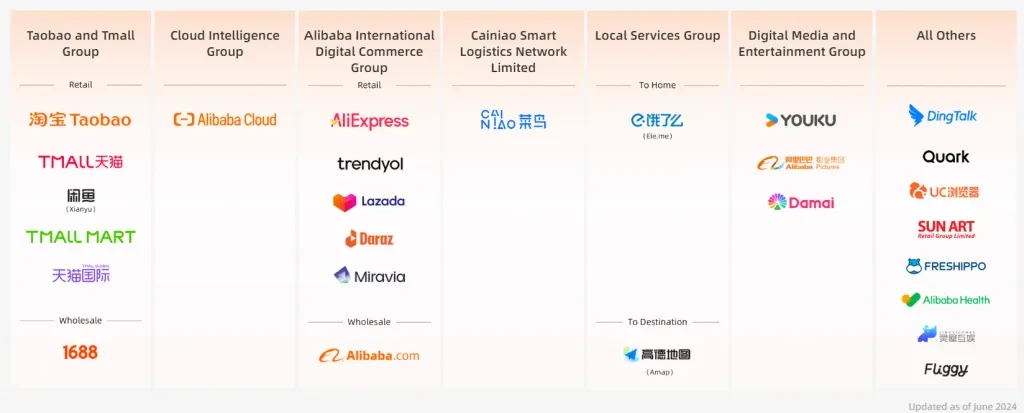
Alibaba Group’s mission is to make it easy for businesses to operate and transform, offering technology infrastructure and marketing reach. This enables merchants, brands, retailers, and other businesses to improve their efficiency, engage with customers, and support digital transformation. In fiscal year 2024, Alibaba’s primary business segments include:
- Taobao and Tmall Group: Dominant in China’s retail e-commerce market, focusing on customer management services to engage consumers.
- Cloud Intelligence Group: Leading in Asia-Pacific’s cloud services, providing a comprehensive suite of cloud offerings and AI-driven solutions.
- Alibaba International Digital Commerce Group: Operates platforms like AliExpress, Lazada, and others to empower global brands and SMEs.
- Cainiao Smart Logistics Network: Aims for efficient global logistics, with services covering both China and international markets.
- Local Services Group: Enhances local consumer services through platforms like Ele.me for food and grocery delivery.
- Digital Media and Entertainment Group: Extends Alibaba’s reach into media through platforms like Youku, offering digital content and entertainment.
Alibaba’s ecosystem includes a diverse network of consumers, merchants, brands, and partners, centered around their technology platforms. The company aims to capture growth opportunities in consumption, cloud services, and globalization, supported by a strong emphasis on environmental, social, and governance (ESG) responsibilities.
